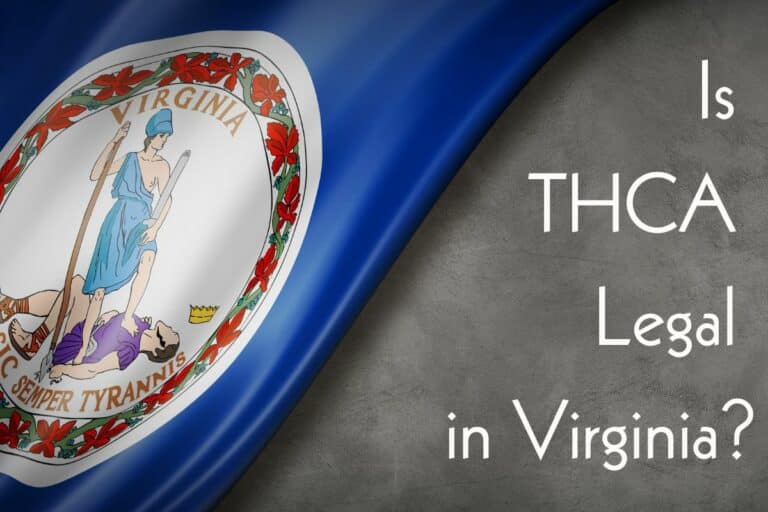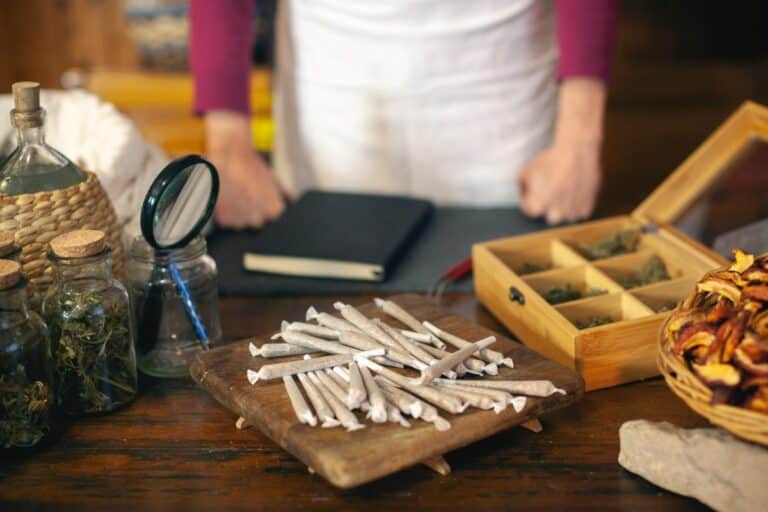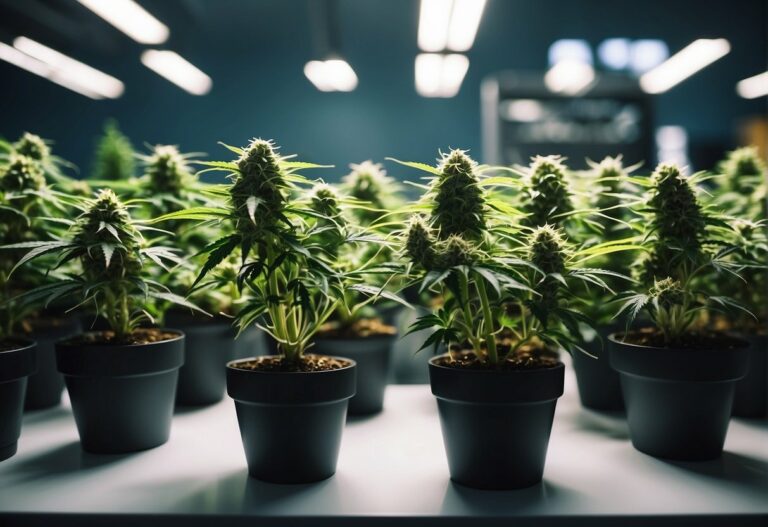Is Delta 8 Legal in Oregon: Understanding State Regulations
Step into the **mind-blowing universe** of Delta 8 THC in Oregon. It’s got everyone from casual browsers to big-time entrepreneurs raising eyebrows in curiosity. Wondering if Delta 8 THC, the chill cousin of the infamous Delta 9 THC from marijuana, is a go in Oregon? Well, Oregon is always ahead of the curve, welcoming hemp treats with open arms. So, for those eager to clear up the haze of regulations around this gentler high, you’ve hit the jackpot. Consider this your ultimate guide to navigating the cannabis jungle. Brace yourself to discover secrets that’ll not only make you wise but might just put you ahead of the game.
- Legality of Delta-8 THC in Oregon
- Understanding Cannabinoids
- The 2018 Farm Bill and Its Impact
- Delta-8 THC Products and Usage
- Regulatory and Licensing Framework
- Where to Purchase Delta-8 in Oregon
- State-by-State Comparison
- Future of Delta-8 Legality
- Frequently Asked Questions
- How can consumers legally purchase Delta 8 products in Oregon?
- What is the status of Delta 8 under Oregon’s HB 3000 legislation?
- What are the regulations governing Delta 8 by the Oregon Liquor Control Commission (OLCC)?
- Are there any restrictions on the types of Delta 8 products available for sale in Oregon, such as gummies or oils?
- Can individuals legally transport Delta 8 products while traveling within or outside Oregon?
- What are the ingredient disclosure requirements for Delta 8 edible products in Oregon?
Understanding the legality of Delta 8 in Oregon requires a closer look at both state and federal regulations regarding hemp-derived products. While marijuana is legal for both recreational and medical use in Oregon, the status of hemp derivatives can be more complex. This is specifically true for Delta 8 THC because of its psychoactive nature and its classification under the broader term of hemp after the passage of the 2018 Farm Bill. It’s important to stay informed about the latest laws concerning Delta 8 to ensure compliance with state regulations.
Legality of Delta-8 THC in Oregon
When considering the landscape of cannabis regulations, you’ll find that the legal status of Delta-8 THC in Oregon is complex, due to varying state and federal laws.
Oregon State Law and Delta-8 THC
As you navigate the cannabis market in Oregon, it is vital to understand the particular stance the state has taken on Delta-8 THC. Despite the general legalization of cannabis, Oregon has specifically declared Delta-8 THC illegal. This distinction arises from the state’s decision to regulate hemp-derived compounds more strictly. In Oregon, any substance containing over 0.3% THC, Delta-8 included, does not conform to the legal definition of hemp and is thus managed as a controlled substance.
Federal vs. State Regulation of Delta-8
While at the federal level, the Agriculture Improvement Act of 2018, also known as the Farm Bill, legalized hemp and by extension, compounds derived from hemp provided they contained less than 0.3% Delta-9 THC by dry weight. This technicality initially left a gray area for hemp-derived Delta-8 THC. However, you should be aware that state law can override federal permissions, as is the case in Oregon. Here, state regulation supersedes federal allowances, making Delta-8 THC a controlled substance despite federal guidelines.
Distinction Between Hemp and Marijuana
Understanding the legal differentiation between hemp and marijuana is crucial. In Oregon, hemp is defined primarily by its Delta-9 THC content; any cannabis plant with less than 0.3% THC on a dry weight basis is classified as hemp and is federally legal. Conversely, marijuana refers to cannabis that exceeds this THC threshold. With this classification, legal products derived from hemp, such as CBD, are distinguishable from marijuana and its byproducts, including Delta-8 THC, now regulated as a controlled substance under state law.
Your comprehension of Oregon’s laws on Delta-8 THC is fundamental, particularly as they diverge from federal regulations and influence the lawful procurement and use of cannabis products within the state.
Understanding Cannabinoids
When exploring the legality and characteristics of delta-8 in Oregon, it’s beneficial to have a clear understanding of cannabinoids, particularly how delta-8 THC differs from its more famous relative delta-9 THC, and what it means for a cannabinoid to be hemp-derived versus artificially derived.
Chemical Properties of Delta-8
Delta-8 tetrahydrocannabinol, commonly referred to as delta-8 THC, is one of the many cannabinoids found in the cannabis plant. Structurally, delta-8 THC is similar to delta-9 THC—the primary psychoactive component in cannabis—but with a few key differences in its chemical properties. These subtle changes impact how it interacts with your body’s endocannabinoid system, potentially resulting in a milder psychoactive effect compared to delta-9.
Delta-8 vs. Delta-9 and Other THC Products
- Delta-8 THC: Typically produces a less potent high and has a slightly different effect profile than delta-9 THC.
- Delta-9 THC: The most abundant form of THC found in the cannabis plant, known for its strong psychoactive effects.
- Other THC Products: Include a variety of THC analogs such as THC-O and THCP, each with their own unique properties and effects.
While both delta-8 and delta-9 are forms of THC (tetrahydrocannabinol), they must be differentiated not just by the effects they induce but also by their legal status in various jurisdictions.
Hemp-Derived vs. Artificially Derived Cannabinoids
Cannabinoids can be derived from the hemp plant—the non-psychoactive variety of the cannabis plant—or they can be created synthetically in a lab. Hemp-derived cannabinoids, including delta-8, typically fall under different legal frameworks than cannabis-derived or artificially derived cannabinoids due to the 2018 Farm Bill, which legalized hemp at the federal level.
- Hemp-Derived Cannabinoids: Extracted directly from hemp plants that contain less than 0.3% delta-9 THC by dry weight.
- Artificially Derived Cannabinoids: Synthesized in a lab, sometimes to replicate the properties of natural cannabinoids, other times to create entirely new compounds.
It’s important for you to note that while synthetic cannabinoids can imitate the effects of their natural counterparts, they may not have the same safety profile and are often subject to different regulations.
The 2018 Farm Bill and Its Impact
Under the 2018 Farm Bill, your understanding of hemp and its derivatives changed significantly, impacting substances like Delta-8 THC.
Legal Status of Hemp and Its Derivatives
The 2018 Farm Bill shifted the legal status of hemp at the federal level. It reclassified hemp—defined as cannabis with a Delta-9 THC concentration of 0.3% or less—as an agricultural commodity rather than a controlled substance. Hemp products, including cannabinoids, isomers, and other derivatives, became federally legal to produce, sell, and consume provided they meet this definition. This change granted your industry access to banking, insurance, and federal grants.
Implications for Delta-8 THC
This legislative change opened the door for hemp-derived compounds such as Delta-8 THC. Delta-8 is similar to the more well-known Delta-9 THC but is found in much smaller quantities in the cannabis plant. Since Delta-8 can be derived from industrial hemp that falls under the 0.3% THC threshold, it often falls within the federal definition of legally permissible hemp products. Nevertheless, because Congress passed the bill, the nuances in state laws like those in Oregon complicate the issue, with some states fully embracing the federal stance while others have pushed back or banned Delta-8 outright. You should be aware that despite federal legalization, the state laws in Oregon dictate the actual status of Delta-8 products.
Delta-8 THC Products and Usage
Before exploring the types of Delta-8 THC products available, it is important to understand that Delta-8 THC is a psychoactive and intoxicating cannabinoid similar to Delta-9 THC, but it is synthesized from CBD. As a consumer, you should be aware of the potency and safety considerations of these products along with their legal status.
Types of Delta-8 Products Available
Edibles: Ranging from gummies to chocolates, Delta-8 edibles offer a longer-lasting effect because of slower digestion and metabolism. Tinctures: Delta-8 tinctures provide dosing control and are consumed sublingually, absorbing quickly into the bloodstream. Vape Products: Vape cartridges that contain Delta-8 THC oil are used for a more immediate effect. Topicals: Although less common, Delta-8 can be found in lotions or creams for localized application.
Consumer Information on Potency and Safety
Delta-8 products vary in potency, which determines their psychoactive strength. It’s essential to start with a low dose to assess tolerance. Product safety is contingent upon reputable brands and stores that offer lab-tested products to ensure they are free from unwanted contaminants.
Extraction and Synthesis of Delta-8
Delta-8 is extracted from cannabis plants but is typically synthesized from CBD due to the low natural occurrence of Delta-8 in hemp. This chemical conversion process is conducted in laboratories and the final products should be verified for purity and potency through third-party testing.
Regulatory and Licensing Framework
When investigating the legal landscape of Delta-8 THC in Oregon, you’ll find a structured regulatory and licensing environment. This system ensures that hemp products containing psychoactive cannabinoids like Delta-8 THC are monitored for public health and safety.
State Licensing for Hemp Products
In Oregon, hemp cultivation and product manufacturing require state-issued licenses. Before your hemp-derived products can be sold, you must ensure compliance with the state’s regulations. Licensing is a critical step: without it, you’re not legally authorized to grow or process hemp. For truly legal operations, the Oregon Department of Agriculture (ODA) has set guidelines that your business needs to follow.
OLCC Regulations for Delta-8
Stores and dispensaries dealing with Delta-8 THC fall under the oversight of the Oregon Liquor Control Commission (OLCC). The OLCC has the authority to enforce regulations specific to cannabinoid products. Here’s a brief of what you, as a retailer or dispensary owner, need to be mindful of:
- Product Testing: Your Delta-8 THC products must be tested and approved.
- Labeling Requirements: Accurate and clear labeling is mandatory to indicate the presence of psychoactive compounds.
- Sales Restrictions: You must ensure that sales of Delta-8 products are done in accordance with state laws to avoid penalties.
Stay informed on the OLCC regulations for Delta-8 to ensure that your business operates within legal boundaries. Remember that regulatory frameworks are subject to change, so keeping up-to-date with the latest information is critical to maintaining a lawful operation.
Where to Purchase Delta-8 in Oregon
Delta-8 THC can be legally purchased in Oregon from various outlets, ensuring you have multiple options tailored to your convenience and preference for obtaining the product.
Retail vs. Online Buying Options
When considering where to buy Delta-8 in Oregon, you have the choice between retail stores and online vendors. Retail offers the advantage of a tangible shopping experience where you can view products directly. Dispensaries and some specialized health and wellness stores in Oregon stock Delta-8 THC products. Conversely, online shopping allows for a broader selection and often, the convenience of home delivery. Reputable online stores also provide lab reports and product details, ensuring that as a consumer, you can make an informed purchase.
Identifying Licensed Retailers
To assure the legality and safety of your Delta-8 purchase, you should only buy from licensed retailers. In Oregon, dispensaries undergo rigorous licensing processes, ensuring they comply with state regulations governing the sale of cannabis products. When in a physical store, don’t hesitate to ask to see their licensing credentials to confirm their authenticity. While at gas stations or grocery stores, the availability of Delta-8 might be more convenient, but it’s essential to verify the product’s origin and lab results to ensure safety and compliance with Oregon law.
State-by-State Comparison
When comparing the legality of Delta-8 across the United States, you’ll find significant variations in regulations, with some states having explicit bans while others permit its use. Your understanding of these laws is crucial if you engage with Delta-8.
Regional Laws on Delta-8
Washington and Oregon are your go-to states if you’re looking for a legal thumbs-up on Delta-8. In contrast, Idaho and Montana have clear restrictions in place that classify Delta-8 as a controlled substance. If you’re in Nevada, you’ll notice that despite its generally lenient stance on cannabinoids, Nevada has specific regulations governing Delta-8.
- Washington: Permitted
- Oregon: Permitted
- Idaho: Banned
- Montana: Banned
- Nevada: Regulated by state law
Bans and Restrictions in Other States
As you look to the expanse of the United States, it’s important to note that states like Arkansas, Kentucky, and Iowa maintain strict bans against Delta-8, aligning it with other controlled substances. Conversely, Michigan and Virginia allow controlled legal use, reflecting a more nuanced regulatory approach. In states where the status of Delta-8 is not explicitly stated, it’s wise to consult the latest updates from the state’s regulatory authority to stay informed.
- Arkansas: Banned
- Kentucky: Banned
- Iowa: Banned
- Michigan: Legal with conditions
- Virginia: Legal with conditions
Keep in mind that policy trends can shift, and even if Delta-8 is currently legal in a state, changes in regulatory attitudes or new legislation can alter its legal status.
Future of Delta-8 Legality
The evolving landscape of cannabis laws directly affects the status of Delta-8 THC. With new legislation and regulatory changes on the horizon, understanding the potential shifts in its legal status is important for both consumers and industry stakeholders in Oregon.
Anticipated Changes in Legislation
You may soon see new state regulations that could redefine the legal status of Delta-8 THC. Changes in Oregon law are expected due to discrepancies between state and federal regulations, particularly around synthetically-derived cannabinoids. Monitoring state legislative sessions will be crucial, as state lawmakers may align more closely with the DEA’s stance on controlled substances or may choose to establish their own framework that explicitly addresses the legality of Delta-8 THC.
Impact of the 2023 Farm Bill
The 2023 Farm Bill is anticipated to bring significant updates to hemp regulation, which may affect the legality of hemp-derived compounds like Delta-8 THC. You should pay attention to how Congress addresses the regulation of cannabinoids, as it could influence the FDA’s approach to these substances. The outcome of the bill will likely shape the future legal landscape for Delta-8 THC, with potential modifications to the definitions of hemp and tetrahydrocannabinols that are exempt from the Controlled Substances Act. Keep an eye on the recent discussions and drafts to foresee how regulatory agencies may be directed to enforce the new changes.
Frequently Asked Questions
Delta 8 THC is a cannabinoid with a burgeoning presence in the Oregon market. This section will guide you through the legal frameworks and regulations you must navigate to understand the status of Delta 8 in Oregon.
How can consumers legally purchase Delta 8 products in Oregon?
You can purchase Delta 8 products in Oregon at licensed hemp and cannabis retailers. It’s imperative to buy from reputable sources that are compliant with state laws to ensure the legality of the products.
What is the status of Delta 8 under Oregon’s HB 3000 legislation?
Oregon’s HB 3000 legislation has established regulations that bring Delta 8 under the state’s definition of adult-use cannabis. This means that Delta 8 THC is regulated similarly to Delta 9 THC and must adhere to the legal framework set forth for cannabis products in Oregon.
What are the regulations governing Delta 8 by the Oregon Liquor Control Commission (OLCC)?
The Oregon Liquor Control Commission (OLCC) regulates Delta 8 products by enforcing potency limits, safety standards, and compliance checks. Producers and retailers must obtain the necessary OLCC licenses to legally sell Delta 8 products.
Are there any restrictions on the types of Delta 8 products available for sale in Oregon, such as gummies or oils?
Yes, there are restrictions on the types of Delta 8 products that can be sold in Oregon. Edibles, such as gummies, and oils must meet specific safety and potency standards. The OLCC must approve all types of products before they’re available on the market.
Can individuals legally transport Delta 8 products while traveling within or outside Oregon?
Within Oregon, you can legally transport Delta 8 products with certain limitations on quantity. However, transporting Delta 8 products across state lines may violate federal law, as Delta 8’s legality varies between states.
What are the ingredient disclosure requirements for Delta 8 edible products in Oregon?
For Delta 8 edible products in Oregon, manufacturers must comply with strict labeling and testing requirements, which include detailed ingredient disclosure. Labels must provide consumers with information about contents and potency to ensure informed and safe consumption.







